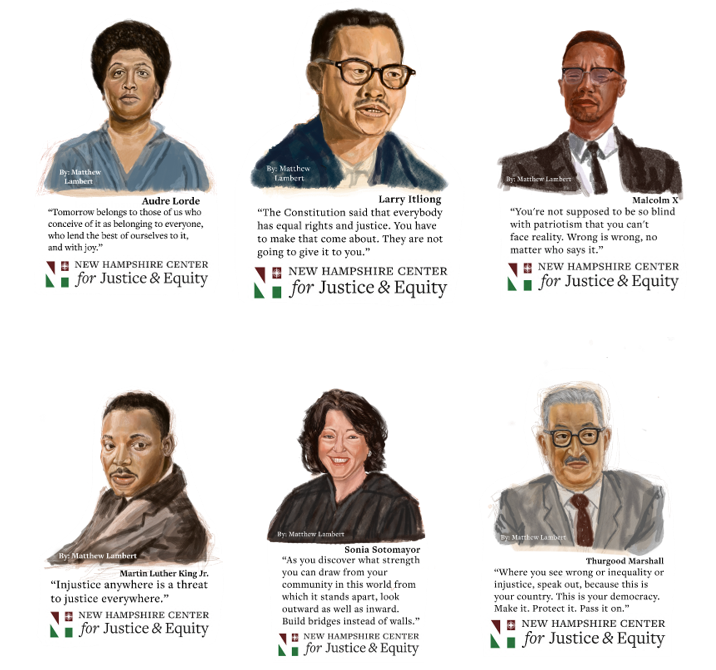NHCJE’s Icon Series: Where Art Meets Justice and Equity
As part of an ongoing commitment to justice and equity, the New Hampshire Center for Justice and Equity (NHCJE) launched its first Icon Series last fall, a collection of stickers designed by the 2023 Wheaton College intern Matt Lambert. This series pays tribute to those who have paved the way for equity and justice across various fronts, including civil rights, racial justice, disability rights, LGBTQ+ rights, workers' rights, and more.
Brought on board for his art and design skills, Lambert created powerful visual elements that incorporate the core values of The New Hampshire Center for Justice & Equity - Love, Trust, Empathy, Inclusion, and Accountability:
“Our team decided the best first step [to create an impact in the community] would be through a sticker collection. Inspired by a piece for our office done by Positive Street Art (Nashua, NH), I drew six social justice activists from various identity groups, whose goals and qualities corresponded with our own.”
The Power of Art in Social Movements
Art has long been a tool for expressing complex ideas, inspiring action, fostering unity, and creating communities. The New Hampshire Center for Justice & Equity’s Icon Series is a testament to this tradition, using visual storytelling to honor the legacy of those who have fought tirelessly for justice.
The first part of the series recognized Angela Davis’ indomitable spirit, Yuri Kochiyama's dedication to solidarity, Judith Heumann's pursuit of inclusivity, Marsha P. Johnson's groundbreaking strides in LGBTQ+ rights, Cesar Chavez's nonviolent protests for farm worker rights, and John Lewis’ long legacy for racial justice. Each sticker - which includes both Lambert’s drawings and a selected quote that exemplifies the icon’s legacy – is a history lesson, reminding us of the ongoing struggle for a more equitable society.
“Choosing the quotes is one of the most difficult parts of my process. I usually think to myself - if these individuals could say one thing to people in the United States right now, what would they say and why? Luckily, these heroes have said many powerful and important messages, so I am always given many choices.”
Artistic expression preserves the history of social movements, ensuring that the struggles and achievements of each time are remembered and honored by future generations. Beyond serving as a record, art also has the unique ability to inspire and mobilize people to action. A powerful piece of art can evoke deep emotions, like anger, compassion, or hope, that compel individuals to participate in social movements and advocate for change. For example, art has been used to show both the positive and negative ways society has treated people and, when done well, serves as a tool for reflection. This is evident in using protest posters, murals, and performance art that rally communities and create a sense of collective purpose and belonging.
“Art does an amazing job at taking a movement or a message and screaming it to people in ways words alone cannot reach. Whether it’s Felix Gonzalez Torres creating an installation out of hard candy that comments on the HIV/AIDS epidemic, or Kara Walker building a giant Black goddess (out of sugar) in a sugar factory that was built from the products of slavery, art can be so powerful when asking for change. I think it is limitless as a tool for justice and equity. It can inspire people to make positive change within their own communities, but it can also advocate for big change boldly.”
Furthermore, art plays a crucial role in empowering voices that have been historically marginalized, providing a platform for individuals and communities to tell their stories, assert their identities, and claim their place in the public discourse. An example of this is Nashua’s Positive Street Art, which leverages urban art to build strong communities through educational workshops, community events, and artistic services.
Another positive nuance of art is that it brings people together in shared spaces and experiences, as shown by the work of U+I Arts in Nashua, NH. Community art projects, public installations, and cultural festivals often serve as focal points for social movements, fostering a sense of belonging and inclusion among participants.
Finally, art challenges the status quo by questioning dominant narratives and proposing alternative ways of seeing and being in the world. It promotes critical thinking and encourages a reimagining of society's structures. Its power lies in its ability to communicate, inspire, and unite, making it an indispensable tool in justice and equity work. The Icon Series is The New Hampshire Center for Justice & Equity’s own intersection of art and social transformation.
Fall 2024 Icons: A New Chapter of Inspiration
After the success of last year’s Icons, The New Hampshire Center for Justice & Equity is excited to introduce a new group of personalities who have made significant contributions to justice and equity. The upcoming collection will feature figures like Audre Lorde, a fierce writer and advocate for intersectional feminism; Larry Itliong, a leader in the farm labor movement; Malcolm X, a powerful voice for racial justice; Martin Luther King Jr., an enduring symbol of nonviolent resistance; Sonia Sotomayor, the first Latina Supreme Court Justice; and Thurgood Marshall, a pivotal lawyer in the fight for civil rights.
Each of these individuals has played a critical role in shaping today’s landscape and their inclusion in the Icon Series is a call to remember and continue their work. These stickers are not merely decorative - they are educational tools and symbols of solidarity, encouraging all who encounter them to reflect on the past and engage with the present.
With the Icon Series, artist Matt Lambert hopes to “honor and highlight these important figures while also pointing to The New Hampshire Center for Justice and Equity as a powerful resource advocating for change,” he says. He is also interested in the impact these stickers can have on people’s day to day:
“My hope is they can inspire people to educate themselves on these figures, what they fought or are fighting for, and how to get involved. I learned a ton when making them! I also appreciate their mobility. A child can see one on a water bottle or someone could notice one on a sign. I would be honored for my art to be a part of someone’s journey, especially if it led to advocacy!”
You can find our Icon Series stickers at all our events. Read all the feature articles on the new Icons on our blog, coming this fall.
If you would like to nominate an icon for next year’s series, do so here:
About Matt Lambert
Matt Lambert
Matthew Lambert is a visual artist based in Hampton, NH. Lambert completed his BA at Wheaton College, where he majored in Visual Art, & minored in the Political Economy. Matthew's current work centers around his identity as a Korean American, adoption, & one's relationship to home & displacement. Matthew's goal at The NH Center for Justice & Equity is to help build the visual foundation of the center that will result in meaningful change down the line. He currently works as an architectural woodworking apprentice at Mark Richey Woodworking & Design.



